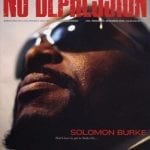Michael Hall – Music to Die To
If I were to perish prematurely (and I can’t imagine it happening any other way), the music running through my brain would likely be the title cut to Michael Hall’s The Song He Was Listening To When He Died. Like much of Hall’s most memorable material, the melody has the sunny, buoyant innocence of a summer hit, while the lyrics carry the more autumnal reflection that life is short and bittersweet. Even the catchiest songs can’t last forever; we’re all gonna die.
Yet the arrangement, as with so much of Hall’s new album, is unlike anything he has previously released. Where Hall’s recordings — from his ’80s days fronting the Wild Seeds through his more recent stint leading the Woodpeckers — have generally captured a bar-band dynamic, this is consciously a studio production.
The opening instrumental hook of the title track features Hall on xylophone, while the climactic collage suggests the cascade of musical snippets that might permeate your brain during those final breaths, the music you’ll take to the grave. It has been said that when you die, an entire life of highlights flashes before your eyes. Here, it’s a playlist that flashes through your ears.
“When I got out of college, I had a couple of bizarre hitchhiking experiences, and one of them involved a lot of pot and terrible driving and really loud music,” explains Hall. “In my memory, it was like this could really be the end. I was stuck in the back seat and I couldn’t get out and these guys wouldn’t stop the car and everybody was really high.
“And the concept of the song is about what happens when you die, of course. In those last 30 seconds, when you still have consciousness, is it like a radio? Are you thinking of one song, or are these the songs that really meant something in your life, whether from some terrifying moment or what you were listening to when your son was born? Who knows?”
The Austin-based Hall can afford to take chances with his music these days, for his day job as a senior editor with Texas Monthly affords a level of security beyond his bar-band scuffling. And as a husband and father (with two teenage stepdaughters and a three-year-old son), he has some different concerns than he did when writing the likes of “Let’s Take Some Drugs And Drive Around”. Sonically, the new album’s aural expansion includes reliance on drum machines and production (though not overproduction) by guitarist “Scrappy” Jud Newcomb and bassist George Reiff.
“You know that Beck record, Sea Change?” asks Hall. “It’s all drum machines, but it’s got beautiful pop songs on top of it. And I was thinking about how drum machines can open up song structures so much. So we started with that and different instruments, taking these song ideas and then maybe trying it on a Wurlitzer instead of an acoustic guitar.”
The results range from the faux folk of “Out Where The Highways Roll” to the industrial-techno throb of “I Had A Girl In Dien Bien Phu” to the tear-your-head-off ferocity of the guitar-powered “Captain, Captain”. While most of the songs are written in the first person, Hall can be as tricky as Randy Newman in the manipulation of narrative perspective. Sometimes the “I” is obviously Hall, sometimes it’s possibly Hall, and sometimes (for Hall’s sake at least) the listener hopes it’s an imaginative projection.
“There’s a couple of songs, ‘I’ll Follow You’ and ‘If You See Me’, that I wrote expressly for my son, Jackson,” Hall explains. “I think I wrote ‘I Had A Girl In Dien Bien Phu’ after watching The Quiet American. And ‘Captain, Captain’ I wrote after spending a long weekend in West Texas, and thinking about Cabeza de Vaca [a 16th-century Spanish explorer whose party was the first from the Old World to reach Texas] and being stranded in the New World, far from home. I think anybody who writes songs like that, they’re trying to tell a story, but there’s probably something of their personal experience in there, too.”
And then there’s “America”, a song that begins as a patriotic anthem but ultimately pledges its allegiance to the band of that name. Joke songs typically fall flat once you’ve heard the punchline, but the reference to “Sister Golden Hair” never fails to crack me up.
Though music still means a lot to the 48-year-old Hall, it doesn’t occupy the central place it once did. “George and Jud and I put our hearts and souls into this record, but it’s no longer something I have my heart and soul in 24 hours a day.” he says. “Ten years ago, making records was the most important thing to me, but I’m on deadline right now for the longest story I’ve ever written, about a guy who was framed for murder 20 years ago and is still in prison. I’ve spent three months on this story, and it’s a labor of passion.
“At a certain point in your life, things like that, as opposed to trying to get Tuesday night gigs at the Continental Club, they win.”




